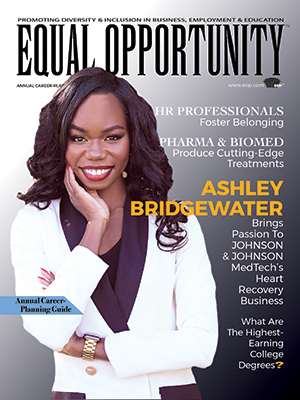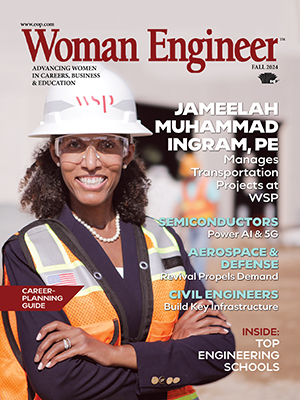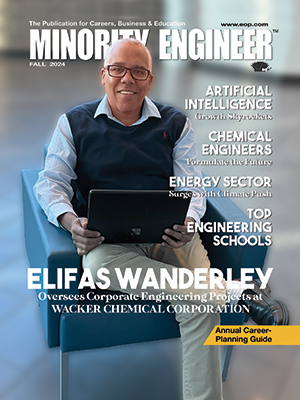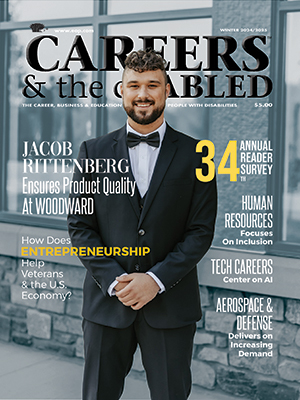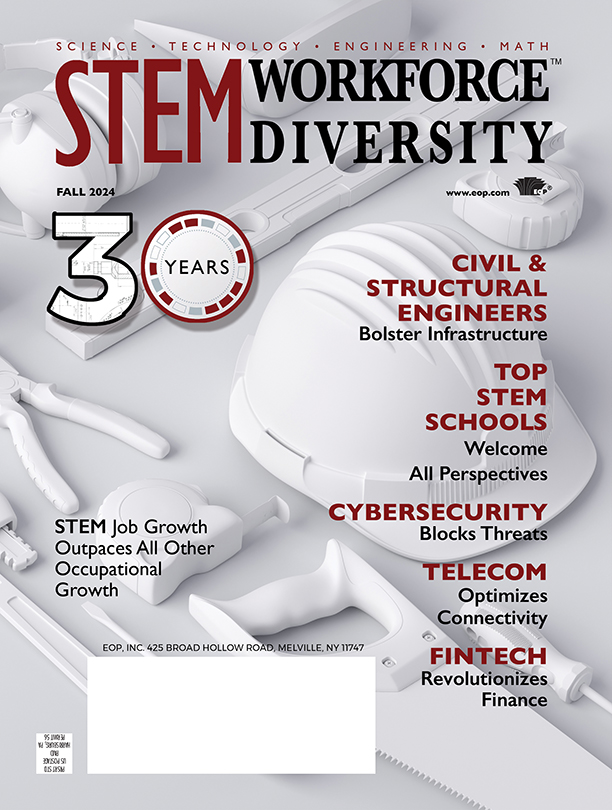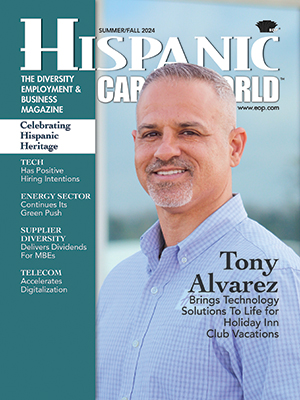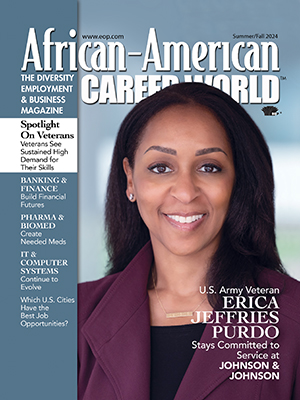By Amanda N. Wegner
Leading manufacturers offer multifaceted career opportunities for individuals who are differently abled while building disability inclusion and building a culture of safety and support for people with disabilities (PWDs).
Wester Is Supported by Oshkosh Defense’s Culture of Safety & Teamwork
As an associate engineer with Oshkosh Defense, Jorel Wester works in operations to design, implement, and deploy assemblies, fixtures, and tools – anything needed to put Oshkosh Defense trucks together safely and efficiently.
Working on everything from tactical vehicles to commercial products, Wester recently worked on the launch of a new heavy tactical vehicle.
“I worked on it from the ground up,” he notes. “I designed and built everything to put it together – the manufacturing line cart, which is what it sits on, the tools needed to lift the truck in place – many tools are needed to put things together.”
Wester has been with Oshkosh Corporation, the parent company of Oshkosh Defense, for six years, the last three of which have been spent in the defense segment.
After leaving the military, Wester initially attended a technical college in the Oshkosh, WI area to be a welder. There he saw the company at every school job fair.
However, due to a traumatic brain injury (TBI) he sustained while in the U.S. Coast Guard (USGC) that left him with epilepsy, Wester learned he couldn’t work as a welder for safety reasons and returned to school to pursue a degree in design engineering. Oshkosh initially hired him as an intern, and, after completing the first part of his education, he took a full-time job in the tool room as a designer.
“It was cool work, and I wanted to keep doing it,” shares Wester, who’s now completing his mechanical engineering degree at the University of Wisconsin, Oshkosh.
He further indicates that, “aside from the fact that we build the best tactical-wheeled vehicles in the world,” the people make Oshkosh a great place to work.
“We all have a vested interest in this. Everyone puts 110% in their jobs. Safety concerns are looked at almost immediately. It’s a very teamwork-friendly company – everyone looks out for one another. That’s something I take to heart. One of the things I brought out of service with me is that you won’t go far unless you’re part of a team. That whole teamwork-camaraderie thing makes things a lot easier.”
Oshkosh’s culture of safety and teamwork is especially important to Wester, as one of the facilities in which he works is Oshkosh’s main welding production facility.
“I have an elevated risk working here, but there are ways to mitigate that. I recognize my limitations, guide myself around, and stay clear from areas that may cause issues,” points out Wester, who also has a service dog, Betsy, who his fellow employees love.
“From the standpoint of having a disability, having my service dog, everyone sees her, and they know why she’s here and what her job is. So everyone I work with and work around sees her, and helps take those extra precautions.”
Wester advises others with disabilities to be open with current and potential employers about their abilities.
“When I left the military, I was apprehensive about returning to work,” the associate engineer recalls.
“But as I went through the medical board, a naval captain gave some advice that stuck with me. He said, ‘Companies hire you because of your ability, not your disability. Be open and honest about what you can do, not what you can’t do. And if it ever comes to a point where you’re singled out because of disability, then they don’t deserve you. Similarly, don’t let others tell you what you can or can’t do, or define what you can or can’t be. You define this for yourself,’” shares Wester.
Oshkosh Corporation and Oshkosh Defense are both headquartered in Oshkosh, WI. Find career opportunities at oshkoshcorp.com/careers. Connect on LinkedIn, Instagram, Facebook, YouTube and X.
Linamen Has a ‘VOICE’ in Elevating Disability Awareness at Northrop Grumman
As a process engineer at Northrop Grumman, Lindsay Linamen creates semiconductor chips through various manufacturing processes.
“At Northrop’s Advanced Technology Lab, I work with a variety of semiconductor materials and have experiences I wouldn’t have at a commercial microelectronics company. This work ties me directly to the important mission work of national security,” explains Linamen, an associate microelectronic semiconductors engineer.
“I own specific tools and their respective processes, and I work collaboratively as a part of a team to improve tool performance and process improvements for our created product.”
With the company for three years, Linamen appreciates the chance to work creatively to resolve complex questions and problems each day.
“I have an amazing team of people around me, and I get to learn daily with extensive opportunities to be mentored by leading Ph.D.s and many great scientists in the field,” she reflects.
Linamen also greatly appreciates how Northrup Grumman values diversity. Linamen has severe combined-type attention-deficit hyperactive disorder (ADHD), which means she has many symptoms in both the inattentive and hyperactive subdomains of ADHD.
“Northrop Grumman has been extremely supportive of disability in the workplace, and I’ve held events with high-level directors self-disclosing disability to a wide audience to shed light on disability in the workplace,” she points out.
“These events have helped curb the stigma about disability at work and increase overall awareness. I’ve had employees at my facility approach me and ask for advice about how they can be more inclusive in the day-to-day work we do, and that has been incredibly rewarding and fulfilling work – and thank our leadership for helping me lead and raise these initiatives at work!”
To further support her work to elevate disability awareness in her workplace, in July 2022, Linamen became chair of the Baltimore, MD region employee resource group (ERG) for VOICE, which is centered around being an ally for disability inclusion. At the beginning of 2024, she transitioned to an enterprise role with VOICE as strategy chair.
“I now have the platform to effect change on a global scale with VOICE,” she underscores.
For career success, Linamen shares advice from a mentor: there are no dumb questions.
“If you don’t know something, then you should always ask. Likely you aren’t the only person who doesn’t understand something, and you’ll never learn the answer or reason why you’re doing something if you don’t ask,” elaborates Linamen, who’s also been fortunate enough to have a mentor who’s gifted at teaching, allowing her to feel comfortable enough to ask questions.
“My career has advanced significantly since working with him, and I’ve learned new tools, processes and much more!”
According to Linamen, there are many ways to become an engineer and many types of engineering. “You don’t need to fit one specific narrative to make it in this field,” she indicates.
“We have programmers, chemists, etc., and many people from diverse backgrounds. Study what you love with a passion and try to learn as much as you can every time you have the opportunity.”
Northrup Grumman is headquartered in Falls Church, VA. Find career opportunities at northropgrumman.com/careers. Connect on Facebook, Instagram, LinkedIn, X, YouTube and Threads.
Kovatch Looks Forward to Helping Grow Jabil’s Deaf Community
Just seven months after mastering his tasks and responsibilities as an assembler at Jabil, Neill Kovatch transferred to another area in the company’s manufacturing operations. He’s now a masker/coater, responsible for chemical mixing, chemical application, parylene coatings and more.
But, while working as an assembler, Kovatch caught an important critical mistake.
“The machine was incorrectly placing parts,” he explains, “and I was able to talk to engineers. We got that part placement to be done in another area because our machines weren’t doing it correctly – I spearheaded that.”
Jabil partners with the world’s top brands, offering comprehensive engineering, manufacturing and supply chain solutions. The company is headquartered in St. Petersburg, FL, and is regularly recognized for its commitment to diversity.
With Jabil for just more than a year, he was directed to the company by his sister, who works for the company in information technology (IT), and, like him, is also deaf.
“She encouraged me to apply,” shares Kovatch. “Once hired, I was amazed at the equal access that Jabil provided for employees who are deaf. Because I’m so visual, I really feel like this job is a good fit for me.”
In fact, he believes that, “if anything, [being deaf] helps me with my work because it’s such a visual job. I rely so heavily on that sense, so I’m able to catch things others may not be able to.”
He adds that what makes Jabil a great place to work is the opportunities it offers to individuals with disabilities (IWDs).
“We’re provided the access we need to do our job. We’re encouraged and supported by upper management for advancement,” he says. This includes interpreters for himself and others who are deaf to ensure there are no communication barriers.
“I appreciate the equal opportunities Jabil has provided for me and other coworkers,” he adds. “I look forward to growing our Deaf Community at Jabil and seeing how far we can go.”
Kovatch advises that if you have a disability and are seeking your place in the workforce, then “don’t let your disability hold you back. There will be jobs out there that match what skills you excel at.”
Jabil is headquartered in St. Petersburg, FL. Find career opportunities at careers.jabil.com. Connect on X, Facebook, LinkedIn, YouTube and Instagram.
Grimm Lives Marvin’s Value to ‘Think Differently’ & Advance Disability Inclusion
As senior manager of human resources and talent acquisition at Marvin’s manufacturing facility at its headquarters in Warroad, MN, Michelle Grimm has worked to advance Marvin’s efforts for disability inclusion.
“I have more than 15 years of experience working alongside individuals with disabilities (IWDs) to advance their careers in the workplace,” notes Grimm.
She adds that Marvin puts its company values first, allowing all individuals to bring forward ideas and different ways of doing things.
“One of our values is ‘Think Differently,’ and this is necessary to approach disability inclusion in the workforce because individuals can do the job, but they might need to do it differently,” explains Grimm.
“Marvin truly cares about its employees and puts people first, which led me to the company. I knew that, at Marvin, I’d be able to grow and sustain a disability inclusion program because it aligns with the company’s purpose and values.”
Marvin has made disability inclusion a priority in its Warroad plant. For instance, the company works closely with service providers and government agencies, such as vocational rehabilitation, to help identify talent, and has created an alternate door for these applicants to enter Marvin. For applicants who can’t complete a traditional application on their own, the company will meet with the individual in person and conduct the application process differently.
The company also works with individuals in transition programs via its local high school, helping students gain work experience, and learn what they may or may not want to do when they exit the school system.
“We strive to create a people-centered experience for applicants that inspires them to attain a role at Marvin. I also want to create a relationship with that person so they’re comfortable coming to work for us.”
Some businesses struggle with disability inclusion, according to Grimm, because it can be uncomfortable and requires change, along with the ability to overcome barriers for people with disabilities (PWDs) creatively.
“Throughout my career, I’ve worked with and for many great companies, but it’s often been a challenge to help them see the value in doing things differently. As businesses, we compete for talent, and must be creative in attracting and retaining talent. Businesses should tap into this talent not just because it’s the right thing to do, but also because it’s good for business,” elaborates Grimm.
“Productivity, safety, and engagement are all impacted when a company has a diversity program in place. Almost everyone who works for you knows someone who has a disability, and it’s a great way for employees to feel proud of where they work when they can see themselves or their loved ones working in the same way they do,” she continues.
As a human resources (HR) professional, Grimm always seeks to ensure the business has the right talent to meet its goals. And, personally, she has multiple family members with disabilities, and she’s seen the struggles they’ve had in the workplace or breaking into the workplace.
“I don’t want those barriers to exist because they’re capable of working and meeting their goals,” she shares. “Without businesses willing to understand that thinking differently makes their workplace better, these family members may not have adequate access to work.”
Grimm advises and encourages career seekers to look to Marvin because the company truly cares about doing the right thing.
“At Marvin, I know I work for a company that believes all people have a place where they can contribute,” she concludes. “Here it’s important we keep people at the center of what we do, and our disability inclusion program is an extension of that.”
Marvin is headquartered in Warroad, MN. Find career opportunities at marvin.com/careers. Connect on Facebook, Instagram, Pinterest, Houzz, Architizer, Dwell, YouTube and LinkedIn.
Building Digital Transformation & Disability Inclusion
Digital transformation and the need for advanced skills are transforming the manufacturing industry. This gap in skills, plus growth in the field, could result in 2.1 million unfilled jobs by 2030 in the U.S., according to a study by Deloitte and the Manufacturing Institute (MI). To battle this gap, manufacturers are seeking new ways to attract and retain talented individuals, including individuals with disabilities (IWDs).
As a result, manufacturing across all sectors offers a panoply of multifaceted career opportunities for people with disabilities (PWDs), as it seeks the skills and benefits of an inclusive workforce. PWDs are making their own way in manufacturing in a variety of ways and roles, and making the most of these opportunities while helping to build a culture of safety and support, and to build a brighter tomorrow for disability inclusion.
Captions & Callout Quotes:
A veteran of the U.S. Coast Guard (USCG), Jorel Wester, who has a traumatic brain injury (TBI) and has a service dog named Betsy, is an associate engineer at Oshkosh Defense.
“From the standpoint of having a disability, having my service dog, everyone sees her, and they know why she’s here and what her job is. So everyone I work with and work around sees her, and helps take those extra precautions.”
Lindsay Linamen, who has combined-type attention-deficit hyperactive disorder (ADHD), is a process engineer and an associate microelectronic semiconductors engineer and the strategy chair of the VOICE employee resource group (ERG) at Northrop Grumman.
“Northrop Grumman has been extremely supportive of disability in the workplace, and I’ve held events with high-level directors self-disclosing disability to a wide audience to shed light on disability in the workplace.”
Neill Kovatch, who is deaf, is a masker/coater, responsible for chemical mixing, chemical application, parylene coatings and more, at Jabil.
“Because I’m so visual, I really feel like this job is a good fit for me. If anything, [being deaf] helps me with my work because it’s such a visual job. I rely so heavily on that sense, so I’m able to catch things others may not be able to.”
Michelle Grimm is senior manager of human resources and talent acquisition at Marvin’s manufacturing facility at its headquarters in Warroad, MN.
“One of our values is ‘Think Differently,’ and this is necessary to approach disability inclusion in the workforce because individuals can do the job, but they might need to do it differently.”

